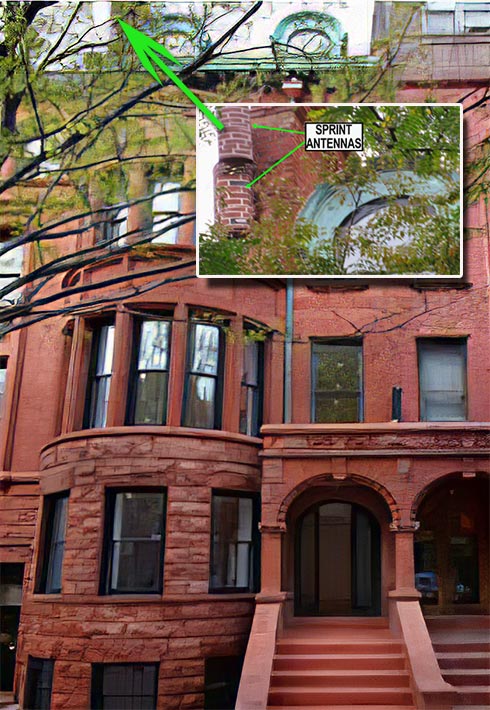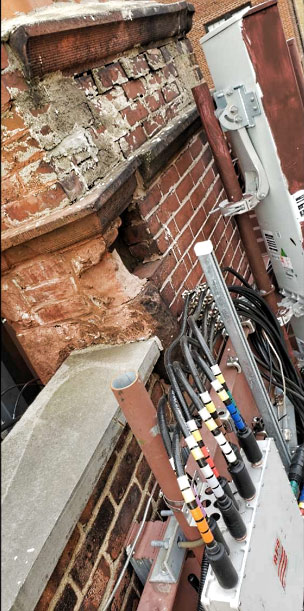A New York City husband and wife filed a lawsuit against Sprint and T-Mobile on Monday, alleging that they installed 5G antennas without their permission and violated the terms of a contract they made with Sprint eight years earlier.

The owners of this Upper West Side NYC townhouse are suing Sprint for unauthorized use of their property, breaching an eight-year-old agreement and causing damage to their $12 million residence.
According to the complaint, Sprint allegedly had previously installed a cell site on a residential townhouse immediately adjacent to the one purchased in 2012 by Gerald Kerner and his wife through their corporation, Ninety Sixty LLC.
The couple’s Upper West Side townhouse is located at 317 West 77th St., New York, and is currently valued at approximately $12 million.
After the Kerners moved into their home they noticed that Sprint had installed their radio equipment on the neighboring rooftop at 319 West 77th St., but the antennas were installed on their wall and were exposing them and other occupants to “illegal levels of RF electromagnetic radiation in violation of permissible federal limits”.
The Kerners then hired V-Comm LLC, an engineering firm that tested the RF levels around the two townhouses.
Utilizing a Narda 8718B RF Radiation Survey Meter and a shaped E-field isotropic probe equipped to measure power density in percent of the FCC standard, the firm found that the antennas facing east across the front of Ninety Sixty’s townhouse – which also were placed by Sprint across the property line between the two buildings – “show[ed] a predicted maximum [radiation] level of 1312% of the FCC standard, and is thereby non-compliant with FCC Rules and Regulations,” and further concluded that anyone who may need to perform typical maintenance, cleaning etc. in the front roof area of Kerner’s townhouse will be exposed to RF emissions levels which exceed the FCC standard, and Sprint should take corrective action.
According to the complaint, after extended negotiations with Sprint, the carrier finally disconnected and removed the offending antennas and also entered into a written agreement on July 31, 2012, which, in part, provided to reimburse Kerner for V-Comm’s fees and identified that Sprint would not place equipment on the adjacent roof which violated the rights of Kerner.
However, in early April 2019, Kerner saw a Sprint contractor installing new antennas painted in faux brick against his chimney which he said that he later found out were for 5G.
Ninety Sixty then contacted Sprint and repeatedly demanded that the carrier vacate its property and comply with the 2012 agreement.
Around May or June of 2019, Sprint said that it was seeking an alternative means for attaching and physically supporting the weight of its equipment on the adjoining roof so that it would no longer have to use the Kerners’ townhouse, according to the lawsuit.
In July of 2019, Sprint removed and relocated the antennas and transmission lines that were attached to the townhouse, but a relocated antenna remained in proximity of the townhouse, and was aimed in its direction. The complaint alleges that to date, Sprint has not removed all of its other equipment that is attached to the townhouse’s exterior wall.

The newly installed and, painted antenna and support pole along with the new transmission lines are pictured above that are are attached to the wall. Damage to the far side of Ninety Sixty’s
chimney is also visible.
In late July and early August of 2019, to provide a protective covering for pedestrians and residents from the danger of falling brickwork from Kerner’s chimney, Sprint provided a protective covering of scaffolding for pedestrians and residents.
In late August, Ninety Sixty informed Sprint that the scaffolding was loose.
On February 7, 2020, in high winds the scaffolding pulled away from the townhouse and was swaying dangerously, requiring police to block off 77th St. and require firefighters to break down the townhouse’s rooftop door to gain access to the interior of the home to secure the scaffolding, causing considerable damage, the complaint alleges.
Firefighters used ropes which they tied at one end to the scaffolding outside the windows on the upper floors, they tried to stabilize the swaying structure until the scaffolding could be dismantled. The other ends of the firemen’s ropes were tied inside the house to furniture and fixtures. In the process, a window was broken and other damage, both inside the house and on the roof, was suffered. After the fire department departed from the townhouse after tying the scaffolding to the inside of the house, the Kerners were permitted to enter the townhouse, according to the lawsuit.
It also states that to date the repairs have not been made and Sprint’s cell site on the roof of the adjacent property differs from its construction plans filed as part of its permit applications.
Ninety Sixty is suing for breach of contract for damages in excess of $75,000; continual trespass requiring payment for using the property in excess of $75,000; and awarding punitive or exemplary damages for Sprint’s ongoing and continuous conduct in failing to take corrective action, of no less than $2 million.


















